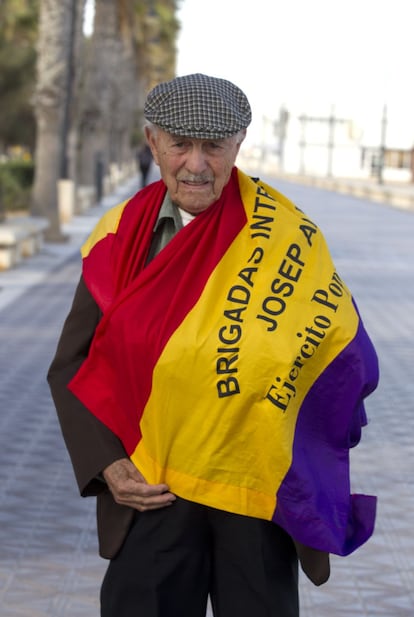Last surviving member of the International Brigades dies at 101
Born in Marseille to Spanish parents, Josep Almudéver enlisted to fight in the Civil War for the Republicans when he was just 16 years old

Josep Almudéver Mateu, a member of the International Brigades who fought for the Republicans in the Spanish Civil War, died May 23 at the age of 101 in France.
Born to Spanish parents who met in Marseille on the eve of World War I, Almudéver was one of the last survivors of the 45,000 volunteers who left their homes in 80 countries to fight against Francisco Franco’s armed forces that were backed by the German and Italian fascist regimes.
Sent to a concentration camp after Franco declared victory in 1939, he was forever haunted by the cries of his comrades shot while trying to escape. “I don’t know why, but they always made me watch the executions of those who attempted to escape from the concentration camp,” he told EL PAÍS in 2013. “I will never in my life forget the screams of the executed.”
Later, he would become a maqui – an anti-fascist guerrilla who carried on the fight against Franco until the early 1960s. In 1947, he was forced to flee to France and didn’t return to Spain until 1965.
Almudéver would later relate his experiences to schoolchildren, students and scholars in high schools and universities. His father was a bricklayer and a militant and Almudéver assumed the mantle of both. When the Civil War broke out, he was just 16 and living with his family in Alcásser, the town his father had fled to before running into his mother, herself on a circus tour, in France. To enlist in the Republican Army, Almudéver lied about his age. When he was discovered, he was sent home. Almudéver returned to the front nevertheless, where he was wounded. Once he recovered, he seized the opportunity to join up again, this time with the Garibaldi Brigade, and was accepted as a Frenchman, translator and combatant.
When the International Brigades disbanded and left Spain after a decision taken by the Non-Intervention Committee, Almudéver made his own way back to Valencia. A year later, as the war ended, he fled with his father to the port of Alicante where he was caught and sent to the Albatera concentration camp.
Two years ago, Almudéver was honored by the regional government of Valencia “for being a living example of the memory of a history that must be kept alive in order to move towards a fuller and fairer democracy,” as the minister of participation, transparency, cooperation and democratic quality, Rosa Pérez Garijo, said at the time.
By that stage, Almudéver stated that he preferred not to talk in terms of a civil war because, in his opinion, it was not an armed conflict between Spaniards but an “international” struggle; a war that involved many countries, if not “the whole world.”
The former soldier pointed out that Nazi troops from Germany and fascist troops from Italy took part on Franco’s side. “The biggest lie is that it was a civil war,” he said. Almudéver also pointed out that the fight of a militiaman “represents the will of the Spanish working people” and when he was embroiled in the conflict this was something he considered “had to be defended against the fascists, no matter what.”
He also recalled how the French authorities never delivered the weapons purchased by the Republican government, claiming that the Non-Intervention Committee would not allow it, according to a passage from his book The Non-Intervention Pact. Poor Republic. Memoirs of the militiaman and international brigader José Almudéver Mateu.
Almudéver’s testimony and that of seven other volunteers of the International Brigades was the focus of the Italian documentary The Last Will Be First, directed by Pasquale D’Aiello, which records the search between 2015 and 2018 for the last Republican volunteers who fought in the Spanish Civil War.
English version by Heather Galloway.
Tu suscripción se está usando en otro dispositivo
¿Quieres añadir otro usuario a tu suscripción?
Si continúas leyendo en este dispositivo, no se podrá leer en el otro.
FlechaTu suscripción se está usando en otro dispositivo y solo puedes acceder a EL PAÍS desde un dispositivo a la vez.
Si quieres compartir tu cuenta, cambia tu suscripción a la modalidad Premium, así podrás añadir otro usuario. Cada uno accederá con su propia cuenta de email, lo que os permitirá personalizar vuestra experiencia en EL PAÍS.
¿Tienes una suscripción de empresa? Accede aquí para contratar más cuentas.
En el caso de no saber quién está usando tu cuenta, te recomendamos cambiar tu contraseña aquí.
Si decides continuar compartiendo tu cuenta, este mensaje se mostrará en tu dispositivo y en el de la otra persona que está usando tu cuenta de forma indefinida, afectando a tu experiencia de lectura. Puedes consultar aquí los términos y condiciones de la suscripción digital.









































